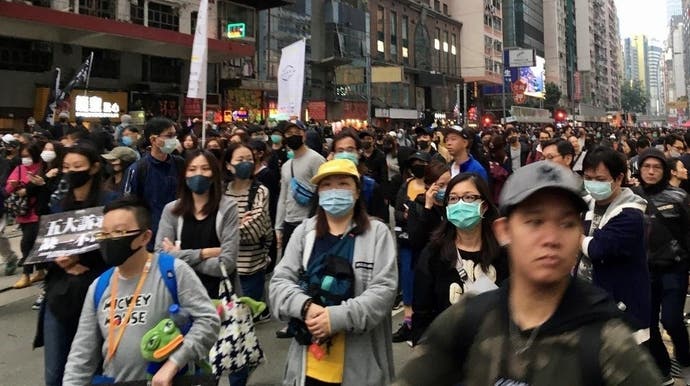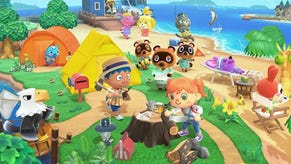How Animal Crossing became a place of protest in China and Hong Kong
The politics of play in China and Hong Kong.
On New Year's Day 2020 I attended a protest march. My friend, a Croatian journalist covering the technology beat for The South China Morning Post, and I, a visitor passing through, left her apartment around noon. Following a fortifying meal of phở we joined the thousands thronging the streets of Wanchai, on the central island of Hong Kong.
Many of the protestors were dressed in black. It was even a family affair for some, with three generations turning up for the march. In Cantonese they chanted, "Liberate Hong Kong, revolution of our era!" It was a chorus sung by all, but most vocally by the young. They were creative: on Christmas Eve and Christmas Day hundreds had occupied malls and shopping areas, with many wearing reindeer antlers. In November, university campuses had transformed into fortresses with the student protestors using tables and umbrellas as bulwarks.
The protests also spilled over, expansively, into the digital realm.
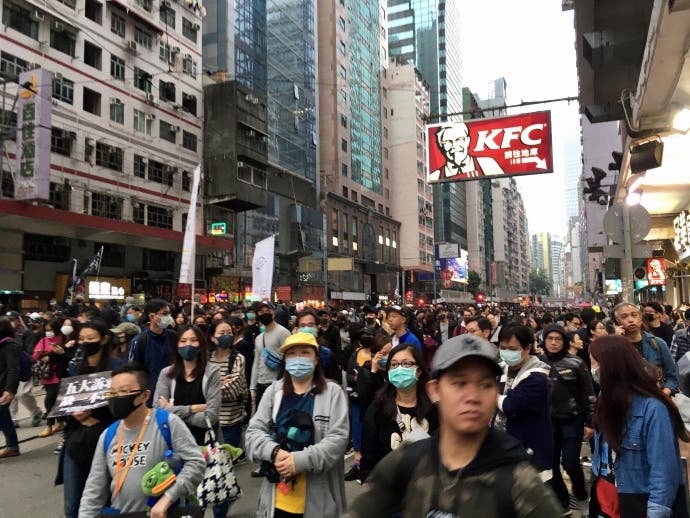
How the Hong Kong protests became interwoven with gaming culture was both fascinating and complicated, says Hugh Davies, a researcher at the Royal Melbourne Institute of Technology. Davies has studied how videogames have been used as political protest and authored a paper, in 2020, entitled 'Spatial Politics at Play: Hong Kong Protests and Videogame Activism'.
Davies was on a residency in Hong Kong researching how the city has been represented in videogames, noting that it's been depicted over 150 times-in games such as Deus Ex, Shenmue 2, and Sleeping Dogs-and exploring why this was, when something even more exciting came to his attention.
"A geographic territory suddenly exploded with a new area of videogame culture", Davies says.
According to the researcher, Hong Kong's protests were a seminal moment in videogame protests because of the way it pervaded so many parts of the culture. Theses include esports, most notably in the incident of a livestream of a Hearthstone tournament; games such as Pokemon Go, Animal Crossing, and GTA V; and locally developed titles Liberate Hong Kong and Revolution in our Times.
Uber was co-opted as a way to taxi protestors to and from protest sites; Tinder, Airdrop, Telegram, among others, became sources of information and recruitment. Furthermore, physical protests themselves became gamified with proposed locations, timing and tactics being voted up or down on social media; and streets demonstrations broadcast on Facebook and Twitch.
"As an inherently spatial medium, videogames are uniquely placed to explore the politics of place", argues Davies' paper.
The politics of disappearance
Let's consider Pikachu. The yellow lightning type, with its cutesy red cheeks, may not appear to be a particularly political creature, but in 2016 that is what it became.
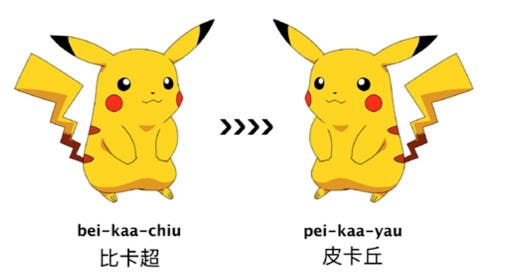
Due to Nintendo changing the transliteration of the pokemon's name from Cantonese into Mandarin, some Hong Kongers saw it as an affront to their linguistic identity. Dozens of demonstrators even marched to the Japanese consulate and demanded a unique Cantonese translation.
How could this seemingly trivial point become such a flashpoint? History provides the answer. Following the British invasion of China in the First Opium War (1839-42), the rocky island of Hong Kong was signed over to the British until it was returned to Beijing in the 1997 handover. As this date loomed, Hong Kongers began to confront their heritage, seeking to understand, and cement, their unique culture, and worrying about how it might change under the crush of Mandarin and Communist China.
"In a space of disappearance, in the unprecedented historical situation that Hong Kong finds itself in, of being caught between two colonialities (Britain's and China's), there is a desperate attempt to clutch at images of identity, however alien or cliched these images are," argued M. Ackbar Abbas' prescient 1997 book Hong Kong: Culture and Politics of Disappearance.
It was within this background and broader context that led to Pikachu becoming a symbol - representing the fear of disappearing culture - and which subsequently appeared in the 2019 protests. Pokemon Go, meanwhile, would be used as a way to signpost where protests would take place, as well as being an excuse-with protestors claiming they were collecting together to play the mobile game in order to circumvent police rules on public assembly.
From one cutesy animal to one named Tom Nook
Since its release on March 20 last year, Animal Crossing: New Horizons has become a global phenomenon; and it has also sold very well in mainland China, which is all the more impressive considering the game has never been officially released in the country.
"It's been a huge success", says Charles Yang Xuefei, who has been covering games in China since 2003 and is editor of IGN China and Game Bonfire. Yang, who is a player himself, says he's observed friends and acquaintances, who have never previously shown interest in consoles, buying Nintendo Switches just to play Animal Crossing. "It's accessible, fashionable, and a very fresh experience", says Yang, and notes this is the first title in the series to include Simplified Chinese text.
The "social circle" effect is not to be underestimated in China, where people are highly influenced by seeing what others are doing-and this has partly propelled sales. The game can be purchased online, and in markets, via grey market vendors.
Chenyu Cui, a games analyst based in Shanghai for market research firm Omdia, estimates that 1.5 million copies of New Horizons may have been sold in China by end of 2020. This estimate is based on discussions with industry insiders and contacts as well as reviewing publicly available sales data from online stores. Since the game is not officially available, estimates are the only possibility. Other analysts I spoke to gave similar numbers, with high estimates topping out at two million.
But in April last year, the game suffered a brief ban, with multiple media suggesting it was caused by Hong Kongers staging in-game protests.
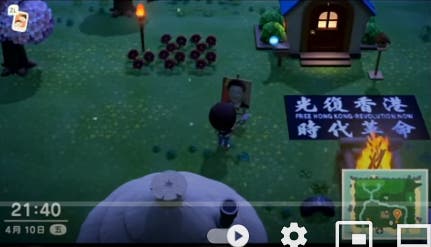
"We can speculate that the temporary ban in 2020 was led mainly by social media and online shopping sites themselves rather than being instructed by the government, as it was lifted shortly after the discussion had subsided", says Chundi Zhang, a games analyst at Ampere Analysis.
"It was more like results of self-censorship to avoid getting involved in politics, and this process can be even symbolic as buyers found they could search AC's nickname '猛男捡树枝 (A tough guy picking up tree branches)' to find and purchase the game."
Emily Chan, a Hong Konger, has been a fan of Animal Crossing since the Nintendo DS, "I loved interacting with the villagers and all that". The 26-year-old, who works as a cosmetics buyer, bought the Switch iteration in a shop in Mongkok, a market-dense district, in May 2020, and has been playing ever since.
By the time Chan got the game, the incidents described above were mostly over, and Chan didn't see anything directly, but she thinks the in-game protests were creative: "That is quite out of the box, to incorporate politics into the game. I also think people are trying to express their political views through the game - personalising or even creating those materials to share among others - when you are not allowed to express freely in reality".
Suiching Or lives around thirty miles from Hong Kong, in the mainland city of Shenzhen, about 45 minutes' drive away. But it's a different world. Google, Facebook, Instagram, Twitter, YouTube, Wikipedia, and many international news sites, are all unavailable for Or, being blocked by China's "Great Firewall". But Or was able to see some of the political statements expressed via the game on Chinese social media sites like Weibo (before they were scrubbed). What did she think of it all?
"They certainly have their freedom to express what they want", says the 24-year-old who works as an online seller. "But Hong Kong problems were very intense then, and their behaviour also expressed to a certain extent that they wanted to split. It didn't feel right".
She said that how individuals play a game is personal, but didn't think a game was the right medium for these types of expression. "I think the purpose of games is to make people happy, not to be used as a tool to promote ideas".
I pressed her-does she think it should be forbidden?
She demurred, "I'm just saying it shouldn't be like this".
This opinion might seem typical of a mainland Chinese, but I would draw your attention to how many people in Western countries object to political gestures in public events like football games (of both the British and American variety). In democratic countries some may not want to see overtly political statements in their games (whether physical or digital ones) but in China, where political expression is extremely curtailed, the populace are even less used to seeing it. But this does not mean, given the latitude, they are unable to participate. This can be in surprising ways, however. For example, one of the few ways Mainland Chinese citizens are allowed to express themselves politically is, unfortunately, in nationalistic and patriotic tones.
In December of 2019, Hong Kong gamers began using virtual private network (VPN) to access the Chinese servers of the open world game: Grand Theft Auto V. Once inside, Hong Kong players customised their avatars to resemble protesters and proceeded to toss petrol bombs, vandalize train stations and attack police in the China's GTA V (Subagja 2019). Mainland players were quick respond, taking to Weibo to enlist assistance to repel the Hong Kong insurgents, reskinning their avatars into riot police in the process. - 'Spatial Politics at Play: Hong Kong Protests and Videogame Activism', Hugh Davies.
Speaking to Davies over Skype from his home in Melbourne, he observes the irony in the above example - the rules of GTA V encourages players to destroy property and conduct criminal behaviour - but in this particular instance it was actually the Mainland Chinese players who were playing the game in a "subversive" way, by playing as the law and order.
The word "play" here deserves a brief aside. Both the term, and the behaviours it describes, can get very technical and academic, but to simplify, play, in this context, means to playfully test the rules and boundaries within a game. And, according to Davies and others in his particular field, this subversive idea of play can have "radical transformative potential".
In terms of Animal Crossing, Davies was not surprised that protest crossed into this space, but he also points to the idea of catharsis. New Horizons is a soothing experience and players in Hong Kong, seeking to escape both the pandemic and political realities, withdrew into this world. And if some players wanted to put facsimiles of the beleaguered Hong Kong leader Carrie Lam into this space and hit her with butterfly nets then that may have been a cathartic experience.
In Hong Kong, both the political idea of disappearance, in how locals fear the loss of language, political identity and cultural heritage, and in 2020, the disappearance of public spaces to protest, due to coronavirus restrictions, meant the digital realm became an avenue for sites and modes of protest.
As videogames and digital spaces become ever more expansive, and blur into the everyday reality of people across the world, it's likely protests will become an ever more common occurrence in videogame spaces.
